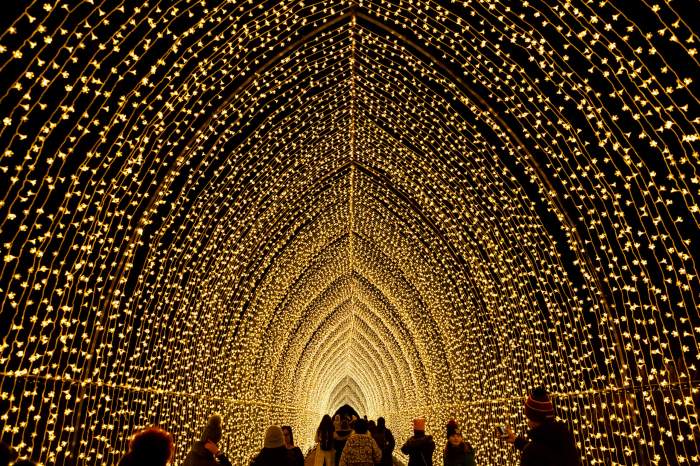By Alex Berger
“(Ours is) a government which, happily, gives to bigotry no sanction; to persecution no assistance.”
— Letter from George Washington to Moses Seixas, sexton of the Touro Synagogue, Newport, R. I. (1790).
On Monday evening, Sept. 17, when sunset approaches and the light shining through the stained glass of the synagogue fades, anticipation fills the air. The Jewish New Year of 5762 — counted from the biblical premise of when the world was created — is approaching.
The rabbis, dressed in white robes, will slowly lift the shofar, a trumpet made from a ram’s horn, to their lips. The members of the congregation, attired in their best autumn fineries, listen as the notes of the shofars hauntingly resonate throughout the synagogue. The familiar sound invokes a spiritual awakening in all who hear its plaintive wail. It is the start of the holiday of Rosh Hashanah (literally, “Head of the Year”).
This observance, known as the Day of Judgment or the Day of Remembrance, is a very important one for Jews around the world. At this time, according to tradition, God judges every person and determines his or her fate for the coming year. He then inscribes His prophecy for each in the Book of Life. But Jews know that prayer and sorrow for one’s sins can change what is written before the Book of Life is closed on Yom Kippur, the Day of Atonement.
Yom Kippur begins this season on Wednesday evening, Sept. 26 and concludes at sundown the following day. During this Rosh Hashanah-Yom Kippur period, designated as the Ten Days of Awe, observers spend the time in introspection and contemplation. Jews pray and express their sorrow for any wrongs they — and, collectively, all Jews — may have committed during the year.
On the afternoon of the first day, Jews take part in a special ceremony. They go to a river or lake, where they pray to have their sins carried away by the water. In the evening, people light candles in their homes and sit down to a holiday meal with family and friends. There are special holiday foods — round, smooth, loaves of bread that represent a smooth and happy year to come; apples dipped in honey to symbolize anticipation for a sweet new year.
The solemn holiday of Yom Kippur is the day when Jewish people recollect any wrongs they may have committed and ask God’s forgiveness. It is the most important and holiest day of the Jewish year. Observers will attend synagogue services in the evening and again the following morning; some stay for the all-day services.
From the beginning of Yom Kippur until sunset the next day, they do not eat or drink anything — not even water. However, children, the elderly, sick, and other Jews unable to fast are excused. The day marks the time when God seals the fate of the people for the New Year that He had determined on Rosh Hashanah. The majority of the day is spent in synagogues in prayer and fasting with intermittent quiet interludes at home.
In the pre-World War II villages of Eastern Europe, the Jewish people practiced a unique custom. Before the New Year, a messenger would travel from house to house carrying a sack. Those who could afford it put coins into the sack, those too poor took coins from the sack. No one knew who gave and who took. No one was embarrassed because he was poor. Every family had money to buy the things needed to celebrate this important holiday.
Sadly, my brother Jack, and his wife, Eve, lost their brilliant, 37-year old son, Jeff, a renowned ophthalmologist, this past year to stomach cancer. He had a wife and three small children. The family's grief is unrelenting and, at times, overwhelming. Jack and Eve will be at their temple in Flushing praying for acceptance and understanding of a loss so acute it plunges them into despair whenever they dwell on it.
In addition, my brother, Larry, and his sons, Zev and Norman, lost Rebecca, their wife and mother in August. How will they, as well as Karen, Jeff's wife, with three young children, get through the “Kol Nidre” (“All Vows”), the haunting melody sung by the cantor? It recalls the history of the Jewish people, and conjures up memories of loved, lost ones. The death of a child, mother, husband or wife tests the faith of the most religious observer like no other adversity. The well-intended bromide that such a tragedy is “God’s will” often is more galling than consoling. The only religious option is to keep loving and praying to God for comfort — which is probably why “Kaddish,” the Jewish prayer in memory of the dead, makes no mention of death but reaffirms faith in and praise for God.
At this prayerful time of the year, Gloria and I want to wish all my Jewish readers, a happy, healthy, sweet, and prosperous New Year. To Jack, Eve, Karen, Adina, Tarnar, and Joseph, Larry, Norman (who reads my column by Internet in Jerusalem) and Zev, I love you all! May you know no more sorrow.
Reach columnist Alex Berger by e-mail at timesledger@aol.com or call 229-0300, Ext. 139.


































